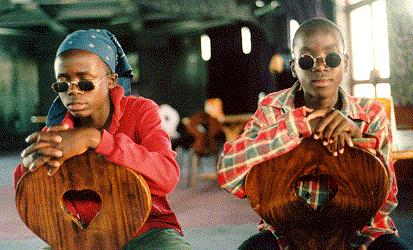
Cool guys at Teentime in Lusaka
RAP, RAGGA AND REGGAE IN
NAIROBI, DAR ES SALAAM AND LUSAKA

Cool guys at Teentime in Lusaka
This is the presentation of our mission sent out before our journey:
LOCAL AND REGIONAL VERSIONS OF TRANSNATIONAL MUSIC
As a part of the Music - Media - Multiculture research project Krister Malm and Monika Sarstad will visit Kenya, Tanzania and Zambia during the period October 10 - November 11 1997. We plan to collect some data in order to study how music that is promoted by the international music industry is absorbed and transformed by local musicians. Among the kinds of music concerned are rap/hiphop, music by megastars such as Madonna, Michael Jackson, Roxette, Ace of Base etc. For instance, rap music in local styles and languages has evolved in many countries of the world, and surely also in your country.
We will try to find and acquire published recordings of music by local musicians that have incorporated elements of international pop music in their own music, make some interviews with musicians, record company staff, journalists or anyone else who could give information on the subject. We will of course collect any other document relating to local, national or regional versions of transnational music.
We are well aware that we can only scratch the surface during a few weeks stay. But we both have previous knowledge of East Africa and its music scene that will make it easier to interpret the material we can collect during this visit.
General background
MUSIC - MEDIA - MULTICULTURE, today and tomorrow (MMM), is a research project at the Royal Swedish Academy of Music. MMM is an interdisciplinary project which examines music and dance as organisatory factors, mainly in the emerging multicultural society in Sweden. The project focuses on cultural encounters, trans-cultural processes and the mass media. One important aspect studied is the role of music in the production of diversity. In order to better understand what is going on in Sweden comparative data is also collected in some other countries.
The transnational music industry is directly and indirectly active in distributing music to all corners of the world. The music distributed is mainly popular music of Anglo-American and Afro-American origin. Quite a few studies have been made of the standardization and homogenization of the musics of the world caused by the impact of the transnational music industry. The exploitation of local musics in this process has also been studied by Krister Malm and Roger Wallis among others (Big Sounds from Small Peoples, London 1984).
At the same time, the output of the transnational music industry is used as a point of departure by local musicians in order to create versions of that music adapted to local conditions and demands. All over the world you find musicians who are not satisfied by merely copying Michael Jackson, Madonna or the U.S. rap stars. They want to create their own new musical style by fusing international musical models with local music. Here the process of homogenization is reversed and turned into a process of diversification. This process there musical diversity is produced has hardly ever been the subject of previous studies.
A special and most interesting case in this context is Afro-American musics that are transformed into local styles by musicians in Africa. We assume that the patterns of change in this case is different from the pattern when the same Afro-American musics are transformed in the cultural context of Sweden. This is one reason why we will try to compare data from East Africa to our Swedish data in order to possibly reveal significant similarities and differences that can increase our knowledge about patterns of change in music and culture at large. The results of the study in East Africa will be presented in English and made available together with other results of the MMM project to anybody interested.
The project workers
The study in East Africa will be carried out by Krister Malm and Monika Sarstad.
Krister Malm is an ethnomusicologist. He has been involved in research into Caribbean music since the 1960s and into East African music since 1973. He started informing the Swedes about East African music with field recordings published in cooperation with the Tanzanian Ministry of Culture on the LP album Music from Tanzania in 1975. He has written books such as the text book Music in the Caribbean and the study Media Policy and Music Activity with chapters on music policies in Kenya and Tanzania. He was together with Roger Wallis responsible for the book and TV series Big Sounds from Small Peoples - the Music Industry in Small Countries which included East Africa. Since 1983 Krister Malm is director of Musikmuseet (The Music Museum) in Stockholm, Sweden.
Monika Sarstad is a cultural anthropologist and producer. She has worked in Zambia for the Swedish organization Afro Art and written on Jamaican music.
Krister Malm and Monika Sarstad gathered during 1996 material on the roots of rap music. This is partly published in Swedish on Internet's World Wide Web as Respekt Nu - Rappens rötter rotas fram (Respect Now - Roots of Rap Revealed). The aim of the Respect Now site is mainly to inform Swedish youth about the deep African and other roots of rap music in order to promote inter-cultural understanding and counteract racism.
Krister Malm usually handles sound recording and Monika Sarstad the cameras in field work
Krister Malm and Monika Sarstad can be reached at
The Royal Swedish Academy of Music, Blasieholmstorg 8, S-111 48 Stockholm, Sweden.
Phone: +46 8 4071816 Fax: +46 8 6118718
Stockholm July 1997
Krister Malm Monika Sarstad